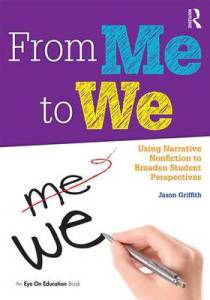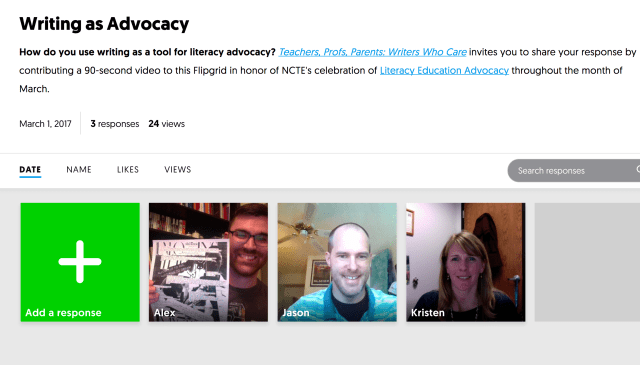Category Archives: Uncategorized
PCTELA 17
Hello PCTELA attendees,
It’s so great to be with you in PA, enjoying some beautiful fall weather, and presenting with my friend Jennie Brown. I hope you enjoyed our presentation.
Below are some links that I hope you’ll find to be useful. First, there is the 20% off coupon code from Routledge along with some of the charts from the presentation. Next are some charts showing text sets which match the nonfiction spiral presentation I presented. Finally, I’ve also attached the PowerPoint slides. Please follow up if you have any questions or ideas for how you might use this material!
Thanks, Jason
Humanities.EDU Resources
Thank you for coming to the presentation today! Below are some resources including the PPT and handout from the session, an additional chart showing the sequence of reading activities in the narrative nonfiction spiral, and some lists of texts which follow the spiral and book-film pattern.
Griffith Humanities EDU Handout
Examining Truth Pres Round Rock
Sounding Our Collective Voices: Using Flipgrid as a Tool for Advocacy
by Sara B. Kajder
 Why Classroom Stories?
Why Classroom Stories?
I carry the stories of the English classrooms in which I have learned and failed and triumphed. I have been formed by the students who taught me what it truly meant to put the right book into someone’s hands or to evoke the piece of writing that was necessary and impactful. And, most importantly, I have been marked by the children who have struggled and who have thrived, both inside and outside of our classroom. When I share the stories of what we have learned alongside one another, our story can start to do work. It might evoke questions that lead to greater shared understanding. It might persuade decision makers to band together to create a change. It might open thinking about what is possible in high-need public schools. It might invite someone to want to teach.
We teach in a time that…
View original post 1,074 more words
Examining Truth: Teaching the New Nonfiction: SXSWedu Presentation
Thanks for coming to my SXSWedu presentation! You’ll find the PPT and Handouts from the session below:
- PPT Presentation: Examining Truth SXSWedu Pres
- Handout #1: Examining Truth SXSWedu Handout 1
- Handout #2: Examining Truth SXSWedu Handout 2
If you tweet, please include #examtruth and @JGriff_Teach, and I hope you’ll join me of a book signing of From Me to We: Using Narrative Nonfiction to broaden student perspectives from 4:00-4:30 in the SXSWedu bookstore on the second level of the convention center.

Did you know that it is literacy advocacy month?
In honor of NCTE’s celebration of Advocacy Month focusing on Literacy Education Advocacy, throughout March, Teachers, Parents, Profs: Writers Who Care is hosting a Flipgrid to showcase the many ways that writing can be used as a tool for advocacy. How do you use writing as a tool for literacy advocacy? We invite you to share your response by recording a short video to add to our grid at flipgrid.com/a4m3riw. Just click this link and then the green “plus” button to contribute.
 flipgrid.com/a4m3riw
flipgrid.com/a4m3riw
At the end of March, we’ll share the responses we’ve received as part of a related Writers Who Care post. We look forward to hearing how you use writing as a tool for literacy advocacy.
Please join us as advocates this month!
Is Your Child Getting a Good Writing Education? Four Questions to Ask Your Child
by Ken Lindblom You want to make sure your child is getting an excellent education in writing. But if you’re not an expert, how do you really know? Here are four simple questions to ask your childr…
Source: Is Your Child Getting a Good Writing Education? Four Questions to Ask Your Child
Book Review: From Me to We: Using Narrative Nonfiction to Broaden Student Perspectives
Grateful to Kate Walker and PCTELA News for this review of my book!
From Me to We: Using Narrative Nonfiction to Broaden Student Perspectives
by Jason Griffith
Full disclosure, I know Jason and he sent me a copy of this book. Before he went off to graduate school in Arizona, I always made sure to attend his PCTELA conference presentations, as I knew I would walk about with concrete ideas I could immediately integrate into my lessons the next week.
Well, this book is sort of like attending a week’s worth of PCTELA presentations–I found myself taking notes about which lessons to integrate and when I would use them. What I love about this book is how Jason is a realistic teacher. He acknowledges that most of us can’t just add new books to our curriculum instantly, that we need ways to supplement the texts we already have. But he does remind us how “As an English teacher, I see myself as an…
View original post 301 more words
10 Mentor Texts to Lift the Level of Students’ Narrative Writing by Stacey Shubitz
As an educator, I’ve come to believe it’s important to know a small collection of books intimately. Not only does this make sense financially, but having a handful of mentor texts you know well allows you to use them with students for many purposes.
When I was selecting fiction and nonfiction texts to feature in Craft Moves: Lesson Sets for Teaching Writing with Mentor Texts, I looked for exquisitely written picture books. While searching for the fiction texts, I looked for books that represented a variety of races, cultures, and sexual orientations since I believe all students deserve to read mirror books, in which they can see themselves, and window books, in which they can learn about others (Bishop, 1990). If we make conscious choices about the mentor texts we present to students – in terms of showcasing impeccable writing and a range of human experiences –…
View original post 898 more words
Three Things My Ukulele Taught Me about Writing
by Patricia A. Dunn George Harrison thought everyone should learn to play the ukulele because it was easy to learn, small enough to take everywhere, and fun to listen to. (He’s right about the second.) So I got one, took a quick lesson from a friend, and then set out on Google and YouTube to see what was what. And now, three months later, it’s all I can do to sit here typing. I really want to go downstairs, take out my shiny green ukulele, open my ever-growing pocket file of downloaded chords and lyrics, and torture the household once again with my now-accompanied caterwauling.
George Harrison thought everyone should learn to play the ukulele because it was easy to learn, small enough to take everywhere, and fun to listen to. (He’s right about the second.) So I got one, took a quick lesson from a friend, and then set out on Google and YouTube to see what was what. And now, three months later, it’s all I can do to sit here typing. I really want to go downstairs, take out my shiny green ukulele, open my ever-growing pocket file of downloaded chords and lyrics, and torture the household once again with my now-accompanied caterwauling.
My adventures learning to play the ukulele have reinforced for me three principles teachers and parents should remember about how students learn to write.
1) Good Writing Involves Choice
I was playing “Twinkle Twinkle Little Star” after fifteen minutes, but after another fifteen I was…
View original post 950 more words
